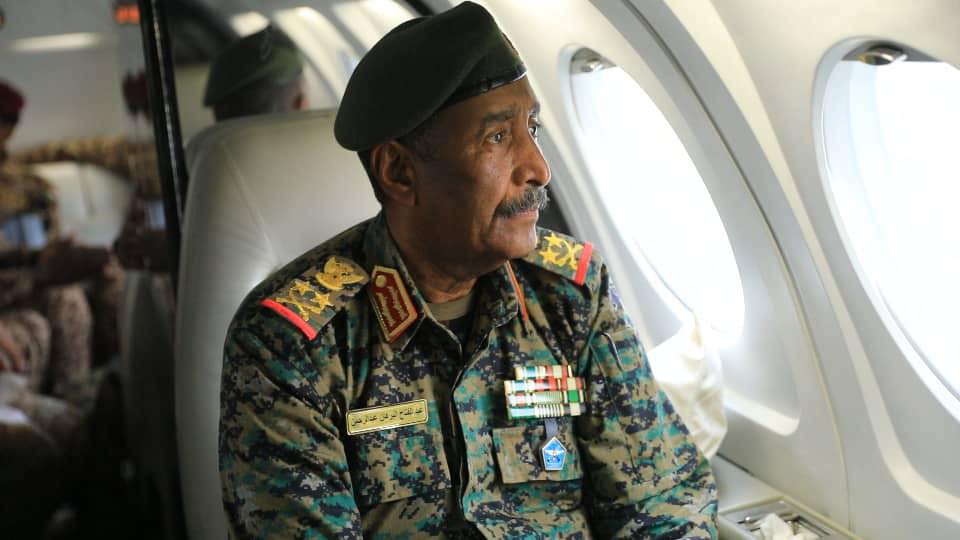Retirement of officers following the Swiss meeting: Political manoeuvres or routine procedures?

Chairman of the Sovereignty Council Abdel Fattah Al-Burhan upon his arrival at Khartoum Airport - Armed Forces Page
Report by Suleiman Siri
The decisions issued by the Commander-in-Chief of the Sudanese Armed Forces, Lieutenant General Abdel Fattah al-Burhan, on August 11, 2025, coinciding with Army Day, to retire a number of senior officers—most of them from the 40th batch—sparked widespread reactions. These decisions were followed by the arrest of Major General Abdel-Baqi Bakrawi, who was accused of involvement in a coup attempt during the transitional period. Bakrawi was initially subject to a military trial before the trial was suspended, and he was released. He was then reinstated to his position in the army as deputy commander of the Armoured Corps following Burhan’s coup against the civilian government headed by Abdalla Hamdok.
But after Burhan issued decisions to retire 26 brigadier generals and 53 brigadier generals, Bakrawi was suddenly arrested again, despite his participation in the April 15, 2023, war, or what the ruling authorities call the “Dignity War.”
Some observers have linked these decisions to the circumstances of the meeting between Burhan and US Advisor for African Affairs, Massad Boulos, in Switzerland on August 11, 2025. They believe the move was a prelude to a new phase of dialogue, amid international pressure to remove Islamists from the military establishment.
On the other hand, others viewed the referral and arrest decisions as a political manoeuvre aimed at reassuring the international community that Islamists were being removed from the army. Some military personnel, however, asserted that these actions were routine and did not imply any political orientation or an attempt to eliminate any particular faction within the army.
Bakraoui’s arrest: liquidations?
Popular Congress Party leader Kamal Omar Abdel Salam told Radio Dabanga that these decisions represent an attempt to eliminate Islamists within the army, describing the move as “a formality not devoid of manoeuvring.” He then asked, “But can Burhan manoeuvre much? I don’t think so.” He cited the framework agreement that ended in war as an example.
In contrast, military and security expert Major General Dr. Moatasem Abdel Qader denied, in an interview with Radio Dabanga, that these decisions were related to an attempt to eliminate Islamists within the army, describing the situation as normal within the hierarchical administrative system of the armed forces, where leadership positions are periodically reviewed based on functional needs.
Omar added that Bakrawi is an opponent of Burhan’s leadership and that he has extensive connections within the military establishment. He questioned whether what is happening represents a bloodbath between Islamists and the army commander. He continued, “If this is the scenario, it will not be in the country’s interest. We have no interest in further collapse, and the demand today is for civilian authority. No one accepts military rule.”
He explained that Bakrawi fought alongside the army in the armoured corps after being released from detention following the coup attempt during the transitional government of Abdalla Hamdok. He then appeared in court, before being released to the battlefield, where he faced referral by the army and subsequent arrest.
Dismissals and the Switzerland meeting
Popular leader Kamal Omar confirmed that Burhan’s decisions were related to his meeting with the US President’s Advisor for African Affairs, Masoud Boulos, in Switzerland, noting that this meeting had consequences. He said: “Despite the scarcity of information about it, the meeting is related to the meeting of the ‘Quartet’ (the United States, Egypt, the UAE, and Saudi Arabia), whose stance on the war in Sudan is known.” He asserted that Burhan would pay the price.
However, military expert Major General Moatasem Abdel Qader strongly denied any connection between these decisions and Burhan’s meeting with Musaad Boulos in Zurich. He pointed out that attempts to link Islamists to the army aim to politicise and dismantle the military institution, considering the army the backbone of the Sudanese state. He added that the United States is pursuing a “pragmatic” approach in its policies, having previously supported Islamists in Afghanistan against the Russians and then negotiated with Iran, Hamas, and other groups based on its own interests.
Army professionalism
Military expert Major General Moatasem Abdel Qader defended the professionalism of the Sudanese army, asserting that it is a professional army devoid of religious or political affiliations, and that any attempts to engage in political activity within it are met with strict legal measures. He stated that all individuals may have personal preferences but attempts to influence their work or create factions within the military establishment are unacceptable and subject to the Armed Forces Law.
He also argued that the exaggeration of the Islamist presence within the military stems from parties that have differences with him. He cited the example of the Forces of Freedom and Change, which, he said, removed a large number of officers from the police, intelligence, and army during its rule, despite the fact that many of them did not belong to the Islamist movement. This led to the state losing influential competencies and expertise, which negatively impacted the security situation.
Abdul Qader accused the Forces of Freedom and Change of attempting to form an internal security apparatus to influence the armed forces, describing it as “real politicisation,” emphasising that the army does not tolerate any form of political organisation or interference within its chain of command.
Cautious welcome
Sadiq al-Mahdi, a leader in the Umma Party and the Steadfastness Alliance, believes that the recent steps taken by Lieutenant General Abdel Fattah al-Burhan indicate a path that reflects a seriousness in addressing the Sudanese people’s entitlement to peace and advancing the national interest. He said, “The promotion and referral lists, which included those with blatant affiliations, came to push the military institution towards consolidating professionalism and neutrality,” explaining that the implications of these measures go beyond calculations of immediate gain and loss.
Not enough on its own
For his part, Yasser Arman, head of the Sudan People’s Liberation Movement-Revolutionary Democratic Current, believes that the significance of Burhan’s decisions lies in their being issued during the war, amidst the contradictions and tensions surrounding it, and that they affected some influential Islamist officers and reorganised the armed forces’ command structure.
Arman emphasised that eliminating Islamists from the army is a key prerequisite for stability, democracy, development, and improving relations with neighbouring countries and the international community. However, he emphasised that the army commander’s recent decisions alone are insufficient, requiring a consensual national project that leads to a democratic civilian transition and state-building. This is where the dialogue on these issues begins.











 and then
and then